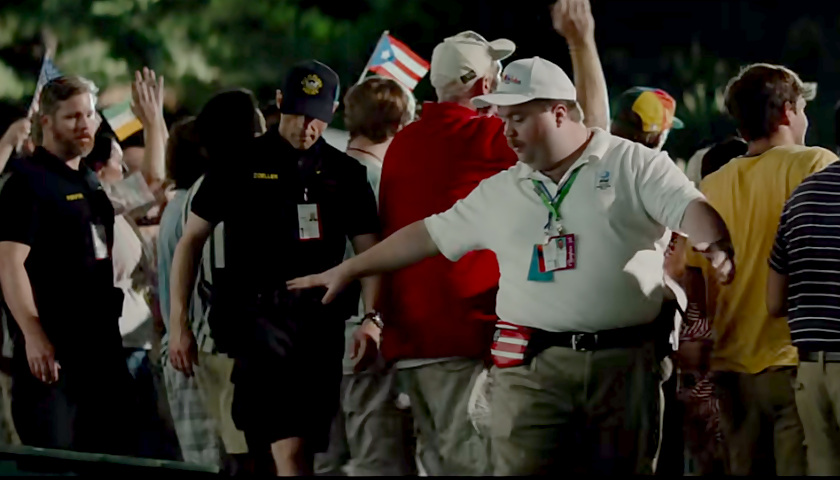by Robert Curry
Something really interesting is happening at Malpaso Productions, Clint Eastwood’s movie production company. Eastwood’s films, especially in recent years, portray the best in the American character through real stories of ordinary Americans called by events to stand up and shine. In his latest, “Richard Jewell,” Eastwood continues exploring a theme I’ve called “American Greatness in the Shadow of 9/11.” The result is a body of work that is awe-inspiring and unlike anything we have seen before in American cinema.
His subject is the American hero in the still unfamiliar new world that emerged after the terrorist attacks of September 11, 2001.
Eastwood’s theme is made quite clear in “Sully.” The film tells the story of “the Miracle on the Hudson.” On January 15, 2009, Captain Chesley “Sully” Sullenberger (Tom Hanks) and co-pilot Jeff Skiles managed to do the impossible. U.S. Airways Flight 1549 from New York’s La Guardia Airport slammed into a flock of geese right after takeoff, causing both engines to fail. The successful water landing on the river next to Manhattan saved the lives of all 155 people on board – and averted another disaster for the city similar to the one on 9/11.
The 9/11 attacks are evoked subtly throughout the film, and the very first moments brilliantly establish the connection between 1/15/09 and 9/11/01.
“Sully” tells the story of a miracle, and is itself a kind of cinematic miracle. This is filmmaking at its best. Like Sully Sullenberger managing to do the impossible, Clint Eastwood manages to do what most directors won’t even attempt because it is simply too difficult. He tells a story we all know, tells it as it actually happened, and succeeds in making a great film. He even makes a film in Hollywood that celebrates America!
In “American Sniper” he tells the story of Navy SEAL Chris Kyle. Kyle, played by Bradley Cooper in the film, saved countless lives, and became a legend among U.S. forces. That made him a prime target of the enemy, placing him in greater and greater danger through four tours of duty in Iraq, only to be murdered at home in America by someone he was trying to help.
Like Sullenberger, Kyle’s astonishing skill puts him far beyond the ordinary. Yet, in keeping with our theme of American greatness, the film is not titled “The Chris Kyle Story.” It is, the title tells us, the story of an American sniper, told with the brilliance we have come to expect from Eastwood.
“The 15:17 To Paris” tells another well-known true story of American greatness. Three young Americans on vacation in Europe subdue a jihadist on a speeding train, saving everyone on board. Once again, we are in the shadow of 9/11. “15:17” has elements of the story of United Flight 93 on 9/11 when a heroic band of Americans on board rushed the jihadis who had taken over the airplane.
In working through the theme of American greatness, Eastwood shows us that we cannot simply rely on our Sully Sullenbergers and Chris Kyles. In the end, American greatness has to come down to you, and me, and the American who lives next door or is in the seat next to us.
There are some very interesting differences between “15:17” on the one hand and “Sully” and “American Sniper” on the other. Sully and Kyle are heroic men with extraordinary abilities—and they are played by movie stars. The three Americans in “15:17,” Anthony Sadler, Alek Skarlatos, and especially Spencer Stone, who displayed astonishing bravery and survived miraculously, are American heroes, yet they are also the boys next door in your hometown—and they portray themselves in the film.
As I wrote before about that casting decision, “You have to work up to a thing like that.”
Where to go from there? “Richard Jewell” is Eastwood’s answer. Here Eastwood rises to the challenge of making a great film by again telling a true story we all know, and recounting it as it actually happened—but this time he makes it the story of an American hero who does not look or talk like our image of a hero and who, as a result, is not treated like one.
Richard Jewell was the American security guard who saved thousands of lives from a terrorist bombing at the 1996 Olympics in Atlanta. The FBI tried to pin the crime on Jewell and the press disgraced itself by running with the story that Jewell was the bomber.
While it is true that the master manipulators of political correctness are going all out to convince you that you don’t want to see “Richard Jewel”—all the evidence any sensible person should need to convince one that he does want to see it—I believe some people are challenged by the film because the central character is not played by an actor like Tom Hanks or Bradley Cooper. Don’t let that keep you from seeing this great film. Jewell can’t be played by a dashing Hollywood type, and he is played brilliantly by Paul Walter Hauser in a once-in-a-lifetime great role. (As always, Eastwood gets great performances out of every member of the cast.)
“Richard Jewell” is film-making at its very best. Go see it. And you might also want to see the other films in this American Greatness series. They are all worth seeing again.
– – –
Robert Curry serves on the board of directors of the Claremont Institute and is the author of Common Sense Nation: Unlocking the Forgotten Power of the American Idea and Reclaiming Common Sense: Finding Truth in a Post-Truth World. Both are from Encounter Books.





